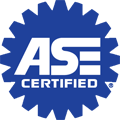
-
3059 Durand Ave. Racine, WI 53403
- 262-554-1170

- 3059 Durand Ave. Racine, WI 53403
- 262-554-1170

Emissions testing is no longer available at our location.

The Wisconsin Department of Transportation (WisDOT) notifies vehicle owners when an emissions test is required. We make notification with the vehicle registration renewal notices we send and at the time vehicle ownership changes.
Vehicles require an emissions test based on:
Vehicle location
Vehicles customarily kept in one of the seven southeastern Wisconsin counties of Kenosha, Milwaukee, Ozaukee, Racine, Sheboygan, Washington and Waukesha. Certain vehicles Autos and light trucks model years 1996 to 2006 that have a gross vehicle rating up to 8,500 pounds, not including diesel powered vehicles. Autos and light trucks model years 2007 and newer which have a gross vehicle rating up to 14,000 pounds, including diesel powered vehicles. Certain regular occasions After a transfer of ownership (transfer of plates or new plates issued). After first registering in Wisconsin. Before renewing registration (biennial testing, see below for details). Certain non-regular occasions When identified as having tampered emissions equipment. When identified with fraudulent vehicle location information. Government vehicles when designated by the department.
Exempt vehicles
The following vehicles are exempt from emission requirements (except for vehicles identified as having tampered emissions equipment):
Vehicles manufactured before 1996. Vehicles manufactured after 1996 that are not OBDII-compliant (must be verified at a test station). Diesel powered vehicles with a model year 2006 and older. Motorcycles and mopeds. Vehicles with a registered gross weight over 14,000 lbs. Trucks with farm registration. Electric powered vehicles. Note: Hybrid vehicles (that use both electric power and gasoline or diesel fuel) are subject to emissions inspection. Non-motorized vehicles. School buses and human service vehicles with seating capacity of 16 or more people. Vehicles registered as special design vehicles, Medal Of Honor and apportioned plates.
When are tests required
Before registration renewal. Vehicles require an emission test every other year before license plate renewal, beginning in the third year following the vehicle's model year. (For example, model year 2008 vehicles first require a test in 2011.) Renewal notices will indicate if a test is due (see sample renewal notice).
The vehicle must pass the emission test before registration renewal. Failure to pass the test prevents issuance of the annual plate sticker, which makes the vehicle illegal to operate after the registration (plate) expires. If you mailed your renewal without the passing the emission test, take your vehicle to one of the test stations. DMV will automatically receive the successful test information and issue the registration and sticker. Your registration and stickers should arrive within a week to 10 days. A test is not required if the vehicle passed a test within 180 days of the registration expiration date. You can check whether your vehicle is due for a test within the next 180 days by entering your license plate on WisDOT's plate inquiry page. If the inquiry result page includes the statement "IM test is needed," your vehicle is due for a test ("IM" = Inspection Maintenance). You do not need a renewal notice or letter from WisDOT in order to have your vehicle tested. Simply visit the emission inspection location and bring one of the following with you:
Certificate of registration Wisconsin title Prior inspection report Letter from the Department MV2016 (Substitute Renewal Notice) After transfer of ownership. Vehicles more than five model years old require a test within 45 days following a change of ownership. WisDOT mails a letter to the owner explaining the test requirements. Failure to pass the test within the 45-day time period will result in a suspension of the vehicle's registration. A test is not required if the vehicle passed a test within 180 days of the transfer of ownership. After registering in Wisconsin. Vehicles previously titled and registered out-of-state and more than five model years old require a test within 45 days after receiving Wisconsin registration. WisDOT mails a letter to the owner explaining the test requirements. Failure to complete the emission requirement within the 45-day time period will result in a suspension of the vehicle's registration. Review the WIVIP vehicle emission test procedure for more information.
About the Wisconsin Vehicle Inspection Program
Why vehicles are tested
The federal Clean Air Act mandates the operation of vehicle emission inspection and maintenance programs in areas throughout the nation with significant air quality issues, including Southeastern Wisconsin. In addition to identifying vehicles violating state emission standards, the Wisconsin Vehicle Inspection Program (WVIP) also identifies vehicles with tampered emission control equipment. The owners of these vehicles are required to have tampered items repaired, replaced, or otherwise returned to proper working order. Motor vehicles are a major source of air pollutants in metropolitan areas. Vehicle exhaust contains carbon monoxide and other pollutants - volatile organic compounds and nitrogen oxides - that react to form ground level ozone. Motor vehicles emit about one-third of Southeastern Wisconsin's volatile organic compounds (mostly hydrocarbons) and about 60% of its carbon monoxide.
Program information
The Department of Natural Resources (DNR) sets vehicle emission standards for the WVIP, and WisDOT administers the program. Currently, WisDOT contracts with Systech International to conduct vehicle emission tests. WisDOT audits inspection equipment and procedures at each inspection location to assure accurate results. Required inspections are free to the motorist, as are the first two re-inspections (if needed). Subsequent inspections, as well as voluntary inspections, cost $15 each. The WVIP conducts approximately 650,000 inspections each year. Questions? Contact: Wisconsin DMV




Copyright © 2015 - All Rights Reserved - pinkallaautosolutions.com
Template by OS Templates